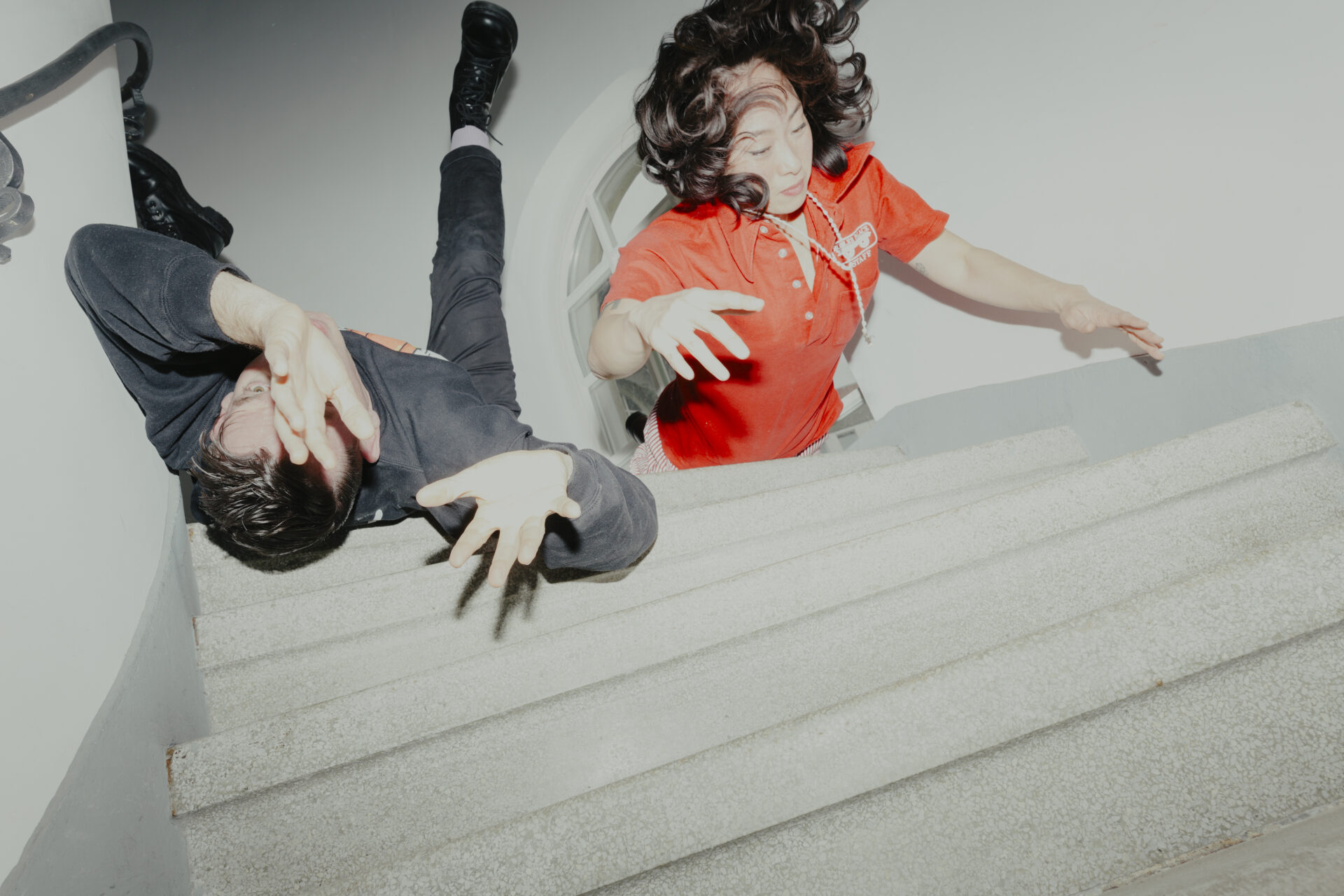“I have a lot of collections, and one of the collections is switchblades.” Jamie Stewart is sitting in a London hotel room, in the nighttime hours of a family vacation with their mother and sister (“like, the cutest thing you can possibly do”), when they bring this up as matter-of-factly as anything they’ve written about across seventeen formidable albums under the name Xiu Xiu. Unlike many of those prior records’ titles, though, which often hew broad and short with names such as A Promise, FORGET, or OH NO, the latest release bears something longer and far more specific: 13″ Frank Beltrame Italian Stiletto With Bison Horn Grips, a prized item in Stewart’s collection. “It’s a really nice switchblade,” they continue. “It’s one of the biggest switchblades in the world.” Then they add, with a laugh, “And I have two of them. In a drawer. In my apartment.”
For Stewart, this choice of title is just what happened to be on their mind in the process. “We just have weird objects or symbols or ideas make their way into the narrative and the emotionality of what the record is becoming,” they explain. Rather than choose a literal or figurative encapsulation of the album’s themes or tone, Stewart notes that they tend to favor something that offers an emotional resonance that fits the songs therein. In other words, “The titles can be a mini-poem in and of themselves.”
However, Stewart offers one possible reading: “Collecting anything is part of an obsession, and this record is about obsession, to a degree.” Then, just as quickly, they clarify again, “But I don’t think that’s why we picked [the title].”
It’s been over two decades since Xiu Xiu began their haunting, unflinching experimental career with a different kind of Knife Play, but the poignancy and unpredictability of making music is still just as switchblade-sharp for Stewart. “It makes me feel weird to say,” they muse. “It basically defines my entire adult life.” But much of our interview finds the multi-instrumentalist frequently speaking about the significance that making music serves and its role as a grounding practice to this day. At one point, Stewart goes as far as to say – with an acknowledgement to how common the refrain is – that music is what saved their life. “I think that’s why I feel such affection toward it.” With a warm smile, they add, “I would give it a big hug every day, if it was a thing I could give a big hug to.”
Stewart is disarmingly forthcoming in our Zoom interview. They speak with a directness and sincerity about even the most raw subject matter, which feels right at home with the naked emotional core of their records’ depictions of abuse, violence, and unrestrained vulnerability. Often, during the most candid spans of our conversation, Stewart falls silent for several seconds, deep in thought about how to most accurately describe their ever-evolving relationship to their own work.
13″ Frank Beltrame Italian Stiletto With Bison Horn Grips is similarly disarming, but in another way entirely: as a record almost totally alien from anything Xiu Xiu have done before. The band – now composed of Stewart, multi-instrumentalist Angela Seo, and percussionist David Kendrick – have never shied away from whatever sound may suit their songs, be that the crisp pop and glitch leanings of Dear God, I Hate Myself or the death industrial-meets-modern classical approach of last year’s Ignore Grief.
But 13″ is yet another unpredictable swerve for the group. Distorted guitars dominate the mix front and centre. Kendrick’s percussion hews closer to steady grooves, rendered in lucid clarity by John Congleton’s mixing. And Stewart’s voice keeps melodic nearly the whole way through, whether in their trademark trembles or soaring through some of Xiu Xiu’s most undeniable hooks to date. At the risk of being reductive, it’s perhaps the closest thing to “accessible” that can reasonably be said of Xiu Xiu.
Stewart feels similarly about how the album sounds. “I don’t think it’s a particularly obtuse or confusing record,” they say. “It seems unusually straight-ahead in a lot of ways.” But, with a bellowing laugh quickly overtaking their words, they add, “But I felt very confused while we were making it.”
Leave it to Xiu Xiu to have an especially unusual story behind something that feels so straightforward. As Stewart explains, the sound of 13” came from Kendrick’s proposal for a Xiu Xiu record that would lean into his love of psychedelic music – a sonic realm that Stewart is very unfamiliar with. The interest, they say, came in the question, “What would happen if I were to dive wholeheartedly into something I didn’t really understand?”
After pursuing that style for about two months, though, Stewart felt an urge to pivot in the opposite direction entirely. They cite a quote from Blixa Bargeld, the German musician who fronts Einstürzende Neubauten, made during his departure from Nick Cave And The Bad Seeds: “I did not join a rock and roll band to play rock and roll!”
“I realised,” Stewart says, “‘Oh my god, I didn’t either. What the fuck are we doing making a psychedlic rock record? What a terrible idea.’”
Some time later, after a Xiu Xiu show in Los Angeles in the midst of the record’s development, viola player and frequent collaborator Ezra Buchla came up to Stewart and spoke only a few words – “Oh, rock and roll, huh?” – before walking away. Stewart quickly realized that the sound of this era of Xiu Xiu wasn’t matching their intentions: “That sounded like what we were doing, and that’s not what I meant for this to sound like.”
The solution? Bounding as far away from the initial intent as possible. “We haven’t essentially tried to do two things at once,” Stewart explains, “which is make a psychedelic rock record, and then do everything we could to nothing to do with psychedelic rock whatsoever.”
It’s this strange progression that makes 13″ Frank Beltrame Italian Stiletto With Bison Horn Grips so idiosyncratic and undeniably Xiu Xiu, even as it piles on powerhouse riff after powerhouse riff. Mid-record cut ‘Veneficium’ acts like a mid-tempo thrash, the scaling harmonies of Stewart’s guitar and Seo’s synth eventually slink around Stewart’s ghostly, reverb-laden wails about being “pressed down into dust.” Meanwhile, highlight ‘Sleep Blvd.’ plays with dynamics like 90s industrial music gone dance-punk, Stewart’s near-whimpered, fearful verses giving way to blistering guitar arpeggios.

Stewart mentions that many of the staggering moments of production and mixing came from conversations they and Congleton had about the latter’s love of Nine Inch Nails’ The Downward Spiral. ‘“Every mixing and production choice they seem to make on that record was iconic and classic,’” they recall Congleton saying in an interview, which they then turned around and brought to Congleton as their vision for 13”. “Think ‘iconic classic,’” Stewart directed. “‘Make everything be too much.’”
As if sensing the irony, Stewart chuckles, “Which is actually kind of a rock & roll thing to do. So I still feel really confused about how this record got made.”
The brashness Stewart speaks of is on full display with ‘Common Loon’, the lead single off 13” and easily one of the most pop-leaning cuts in Xiu Xiu history. Stewart’s guitar work on the song glides, the intermittent buzzing distortion feeling more like an overflow of exuberance than an element of harshness, as in Xiu Xiu’s past. Stewart talks about the track as one that revels in queerness and perversity, a rare instance of Xiu Xiu covering that thematic ground “without there being some sort of negative consequence or tragedy at the end.” Or, as Stewart more simply puts it, “It’s a song about being cuckoo, and being totally fine with being a cuckoo. No pervert or cuckoo does anything but make the world more interesting.”
That’s not to say that 13″ Frank Beltrame Italian Stiletto With Bison Horn Grips foregoes serious, probing questions in line with Xiu Xiu’s capacity for peering into human darkness. Late in the record comes ‘T.D.F.T.W.’, whose acronym is an abbreviation of its chorus: “the devil forgiven / that’s why!” Given how severe much of the transgressions detailed in Xiu Xiu albums can be – whether in the cannibalistic murder narrative of Dear God, I Hate Myself’s ‘House Sparrow’, or in the stark depictions of civilian casualties at the hands of the military on Fabulous Muscles’ ‘Support Our Troops OH!’ – I feel that it’s especially imperative to ask Stewart what bringing up forgiveness entails, in light of their typical subject matter.
Stewart is particularly pensive in responding to this thread. After a long bout of silence and consideration, they say, with a measured tone, “It’s certainly been a dichotomy in the band to try to deal with the evil that men do, and deeply wanting to not give up on the possibilities for humanity. Being deeply cynical and deeply wounded by a lot of things and other people, but still needing and wanting to continue and see what could possibly happen next – in spite of that, or in light of that.”
We discuss the fraught nature of forgiveness for some time – how far it can reasonably be applied to those who have done great evil, our own journeys to becoming more forgiving people, and what forgiveness may even constitute. “In the broadest possible way,” Stewart proposes, “facing something is akin to trying to deal with some sort of forgiveness – to try to find some kind of empathy for somebody who may have done something horrible, and to not give up on that person. Just through time and a fucking ton of therapy, I’ve managed to sort out a lot of abuse I dealt with as a kid. I think that annihilation or annulment of that person by not facing it is the opposite of forgiveness.”
Stewart is vehemently honest about their own struggles in making it to where they are today on this front: “I bear horrible grudges and have an awful temper, and it’s one of the things I like the least about myself – being unable to forgive people and let things go. It’s something that’s extraordinarily difficult for me to do, and I don’t feel great about it.” But they stress that a core part of their tenets involve “attempting to understand why or how somebody might have done something,” and taking this understanding as a lesson in how to not doom themselves to repeat it – ”to not continue to participate in that negative trajectory.”

They stress that, above all else, ‘T.D.F.T.W.’ is merely a way to begin exploring these questions and open that dialogue, rather than something that seeks to provide definitive answers on a knotted subject, and that they’re still reckoning with many of the questions that song asks long after the record has been finished. That especially pertains to how they’ve been processing these questions on a global scale, seeing evil become “more profound” through ongoing genocide. “The world seems to be teetering more precariously than I can ever think of it having been teetering, largely due to the acts of very specific, individual evil people,” Stewart elaborates. “How does one face or deal with that without making it worse, without rolling over? And collectively, how are we going to deal with that?”
Like much of their output, there are no easy answers to much of what Stewart brings up. But as far as the personal state they find themselves in, Stewart notes that they’ve had time with age to work through those processes on an emotional level. “I’ve gotten older and had time to chill out a little bit,” they say. “You learn more and you can handle crises a little better as you get older. I’ve come to be able to deal with my completely chaotic psychology in a little more of a productive way, through experience. ‘That doesn’t fucking work, don’t do that anymore’ – that type of thing.”
They don’t shy away from the difficulties in that process, as comes with anyone grappling with the same issues of emotional dysregulation. At one point, Stewart simply tells me, “The inside of my mind is a fucking draaaaag,” elongating the vowel in a self-deprecating laugh. We discuss the last verse of album closer ‘Piña, Coconut & Cherry’, where Stewart screams in an unguarded panic, “You can’t refuse love like this / It’s criminal / You must love me, love me, love me.” It’s the most unambiguous moment on the record that illustrates that part of Stewart, and it’s a choice to not shy away from the ugliness of living with those thoughts.
“I don’t love feeling like shit most of the time,” Stewart says. “I don’t love having a bad attitude, or having had a lot of rotten things happen to me or people I care about. I’m trying to be less insane. I’m really tired of being insane. But even in the midst of that, losing it is very much a part of what my existence is.”
“I promised my mom a long time ago that I wasn’t going to kill myself,” they continue. “It’s just off the table. So if I’m not going to kill myself and I’m going to keep existing as a human, I’ve really got to deal with what a drag it is having the brain that I have. But I still have that brain.” In ending the record with this kind of performed outburst, that recognition hovers long after the album fades out, as if a tacit acknowledgement that emotional states like these are ongoing affairs and persistent undertakings, rather than anything that can be cleanly resolved in the length of a single LP.
Which brings our conversation back to how important making music has been for Stewart’s survival: toward the end of our hour of chatting, Stewart describes how time has shifted the ways they use Xiu Xiu as an outlet for the turmoil and trauma in their life. “When we first started,” they explain, “it was coming a lot more from a sense of craved desperation. My personal and family life was a complete nightmare, and it was a much more animalistic process.”
Somewhere along the way, however, the prolonged dedication to Xiu Xiu turned Stewart’s creativity into something “a little more ritualized,” akin to a deliberate practice rather than the more instinctive approach of the early material. But Stewart insists that they would still “lose [their] mind” regardless if they didn’t have music to work through everything, saying, “It remains as necessary as it ever was, but I’ve been able to have that necessity become something that’s less driven by fear, and more driven by need and devotion. It’s a way to organize all those excessive, divergent, not necessarily positive feelings, and keep them from being wholly destructive.”
13″ Frank Beltrame Italian Stiletto With Bison Horn Grips is released via Polyvinyl on 27 September. Xiu Xiu tour the UK and Ireland in November. For dates, click here.


![Xiu Xiu - Common Loon [OFFICIAL MUSIC VIDEO]](https://thequietus.com/app/cache/flying-press/4a6e8640d4262adcf037cc7d6248a61c.jpg)




